When I told family and friends that Rwanda was on the itinerary for my visit to Stephen Lewis Foundation funded projects in Sub Saharan Africa, many expressed concern, wondering whether it was safe. For most of us, the gruesome pictures and stories of the genocide are our first thought when Rwanda is mentioned.
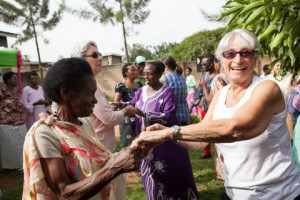 I didn’t really know what to expect when our bus entered the Village of Hope, the Kigali center of the Rwanda Women Network (RWN). I was prepared to be serious and empathetic in the presence of women who had gone through severe trauma. Instead, we were greeted by exuberant song and dance, embraced and engaged in a celebration that emphasized accomplishments in overcoming the horrors of the past and finding a way forward through communal effort. The logo of the RWN states that it empowers, organizes, networks and transforms. We, 22 grandmothers from across Canada along with Stephen Lewis Foundation staff, were fortunate to see these statements in action and witness the results.
I didn’t really know what to expect when our bus entered the Village of Hope, the Kigali center of the Rwanda Women Network (RWN). I was prepared to be serious and empathetic in the presence of women who had gone through severe trauma. Instead, we were greeted by exuberant song and dance, embraced and engaged in a celebration that emphasized accomplishments in overcoming the horrors of the past and finding a way forward through communal effort. The logo of the RWN states that it empowers, organizes, networks and transforms. We, 22 grandmothers from across Canada along with Stephen Lewis Foundation staff, were fortunate to see these statements in action and witness the results.
The Village of Hope was started in 2000, responding initially to the need for safe housing for widowed survivors of the genocide and their children. Laurance is one of the many women who had lost everything, had become HIV+ and needed health care, food and access to skills to support herself and her family. She tells her story: “It was as if we were nothing … just seven women with only a bench to sit on. We had no food, no clothes, no shelter; when you have nothing to live on, you are nothing”.
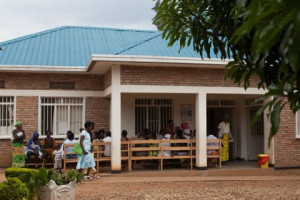 She joined the Polyclinic of Hope, the first center of RWN in 1995, and received help and counseling. She now lives in the Village of Hope. She continues: “I am a grassroots woman who does not know how to read or write, but who is a powerful member of the RWN as a mobilizer and an activist. I was a victim of rape during the genocide. I am HIV/AIDS+ as a result, but working in RWN has taught me to live positively. In the first three or four years, it was very hard. I just hated everybody. But we started working together, sharing our grief. With the help of RWN, we started growing food together, found medical care and learned new skills. I have now been living with HIV, positively, for 20 years. My grandchildren are growing up and going to school. I am the chairwoman of a home-based care group and I am a Community Outreach Worker. There are still many women and children outside RWN who need help.”
She joined the Polyclinic of Hope, the first center of RWN in 1995, and received help and counseling. She now lives in the Village of Hope. She continues: “I am a grassroots woman who does not know how to read or write, but who is a powerful member of the RWN as a mobilizer and an activist. I was a victim of rape during the genocide. I am HIV/AIDS+ as a result, but working in RWN has taught me to live positively. In the first three or four years, it was very hard. I just hated everybody. But we started working together, sharing our grief. With the help of RWN, we started growing food together, found medical care and learned new skills. I have now been living with HIV, positively, for 20 years. My grandchildren are growing up and going to school. I am the chairwoman of a home-based care group and I am a Community Outreach Worker. There are still many women and children outside RWN who need help.”
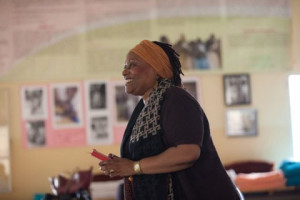 “Empowerment of women is a process”, explained Mary Balikungeri, the visionary founder and leader of RWN. From a small beginning of 20 simple but safe and adequate houses with 20 grandmothers and over a hundred orphaned children, the Village of Hope has grown to a model community, with a medical clinic that provides healthcare for the district surrounding the Village of Hope, educational and counseling services, training for volunteer community health workers and paralegals, and a community garden to grow food.
“Empowerment of women is a process”, explained Mary Balikungeri, the visionary founder and leader of RWN. From a small beginning of 20 simple but safe and adequate houses with 20 grandmothers and over a hundred orphaned children, the Village of Hope has grown to a model community, with a medical clinic that provides healthcare for the district surrounding the Village of Hope, educational and counseling services, training for volunteer community health workers and paralegals, and a community garden to grow food.
Mary Balikungeri is passionate, eloquent and inspiring, as she proudly shows us around the offices and medical clinic of the Village of Hope. “Women need to have the right and the power to make decisions, about their own health, their sexuality, their own destiny. We have developed a ‘score card’ for politicians and we call them to account for their actions when we don’t see follow-up of their election promises! We have a special program to educate women about their rights to land and inheritance, we train paralegal community workers who go to communities to talk about these rights, and will go to court with a woman who is threatened or bullied to abandon these rights … Rights-based approaches to development promote justice, equality and freedom. They tackle the power issues that lie at the root of poverty and exploitation.”
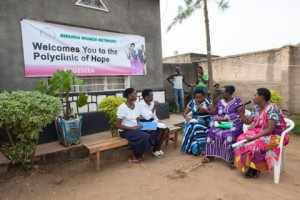 The first Polyclinic of Hope was established in 1995, and in 2000, building of the Village of Hope was started with help from the international community. Stephen Lewis visited in 2003 and was so impressed by the work being done that the Village of Hope was one of the first projects to receive funding from the Foundation, even before the Grandmothers Campaign was started. As with other Stephen Lewis Foundation projects, the key to the success lies in its ‘holistic’ nature, addressing the full array of needs of the women and children who are brought into the program: food, proper shelter, education and health care, skills training, but also grief counseling and working towards rebuilding self esteem and self reliance.
The first Polyclinic of Hope was established in 1995, and in 2000, building of the Village of Hope was started with help from the international community. Stephen Lewis visited in 2003 and was so impressed by the work being done that the Village of Hope was one of the first projects to receive funding from the Foundation, even before the Grandmothers Campaign was started. As with other Stephen Lewis Foundation projects, the key to the success lies in its ‘holistic’ nature, addressing the full array of needs of the women and children who are brought into the program: food, proper shelter, education and health care, skills training, but also grief counseling and working towards rebuilding self esteem and self reliance.
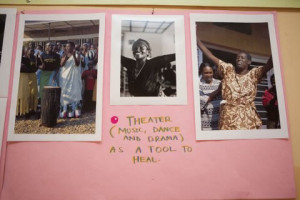 At the same time, their abilities need to be recognized and expressed in the new, healing community they create together. As soon as possible, they need to be part of the rebuilding effort. Through song, dance and helping each other, they celebrate their new found power, realizing that being able to overcome hate is the true victory over their abusers. In addition to the Village of Hope, there are now five Polyclinics of Hope around the country.
At the same time, their abilities need to be recognized and expressed in the new, healing community they create together. As soon as possible, they need to be part of the rebuilding effort. Through song, dance and helping each other, they celebrate their new found power, realizing that being able to overcome hate is the true victory over their abusers. In addition to the Village of Hope, there are now five Polyclinics of Hope around the country.
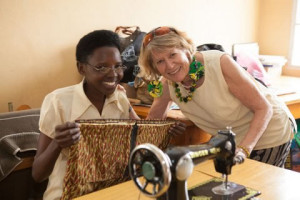 The Policlinics are not able to house women and children, but they are a centre where women and people living with HIV/AIDS can find help and assistance. In education for orphans and vulnerable children, they concentrate on health and sex education as well as the importance of women’s and children’s rights. Skills training includes the training of paralegal volunteers who receive instruction about the rights of women with respect to land, homes and inheritance, as well as family law, so they can avoid ‘landgrabbing’ by unscrupulous relatives or being ’inherited’ as a slave by a relative of their dead husband. These volunteers go to rural communities, and by means of staging a play, communicate the message about new laws to a population that is often still unable to read.
The Policlinics are not able to house women and children, but they are a centre where women and people living with HIV/AIDS can find help and assistance. In education for orphans and vulnerable children, they concentrate on health and sex education as well as the importance of women’s and children’s rights. Skills training includes the training of paralegal volunteers who receive instruction about the rights of women with respect to land, homes and inheritance, as well as family law, so they can avoid ‘landgrabbing’ by unscrupulous relatives or being ’inherited’ as a slave by a relative of their dead husband. These volunteers go to rural communities, and by means of staging a play, communicate the message about new laws to a population that is often still unable to read.
We visited the Genocide Museum, a deeply moving and unsettling experience that perhaps one day will get an article of its own. Near the end of the exhibition is a wall dedicated to the enormity of the task that faced the leaders and the surviving population of Rwanda, the need to rebuild the country, re-establish a working society and find a way to avoid revenge and further bloodshed. A quote from the first woman Justice Minister in the new Cabinet impressed me deeply: “There can be no humanity without forgiveness, but there can be no forgiveness without justice, and yet justice will be impossible without humanity”.
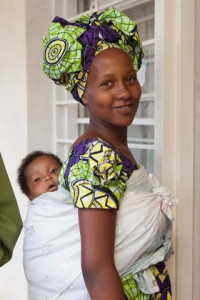 The work being done in the Village and Polyclinics of Hope is a full expression of what humanity can accomplish, while their outreach to neighbouring countries where similar projects are being set up following this model with its proven track record, is a further expression of how success builds success. It convinced me that calling attention and continuing to support this work is necessary for my humanity, as is continuing to spread the word about the Stephen Lewis Foundation.
The work being done in the Village and Polyclinics of Hope is a full expression of what humanity can accomplish, while their outreach to neighbouring countries where similar projects are being set up following this model with its proven track record, is a further expression of how success builds success. It convinced me that calling attention and continuing to support this work is necessary for my humanity, as is continuing to spread the word about the Stephen Lewis Foundation.
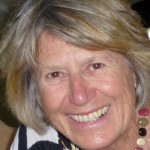 Paxie Vreede
Paxie Vreede
Email Paxie Vreede
See all articles by Paxie Vreede



